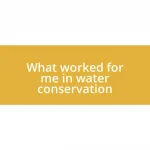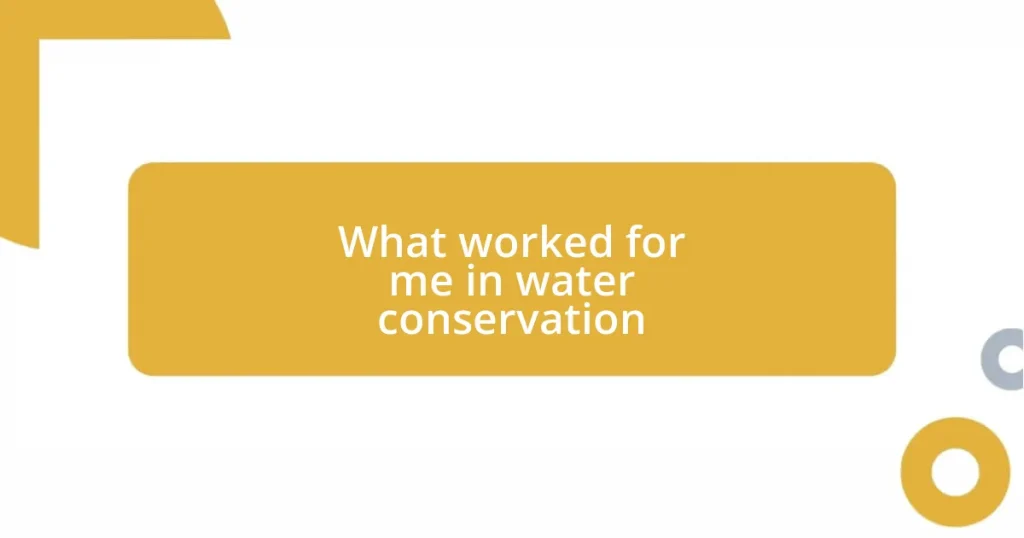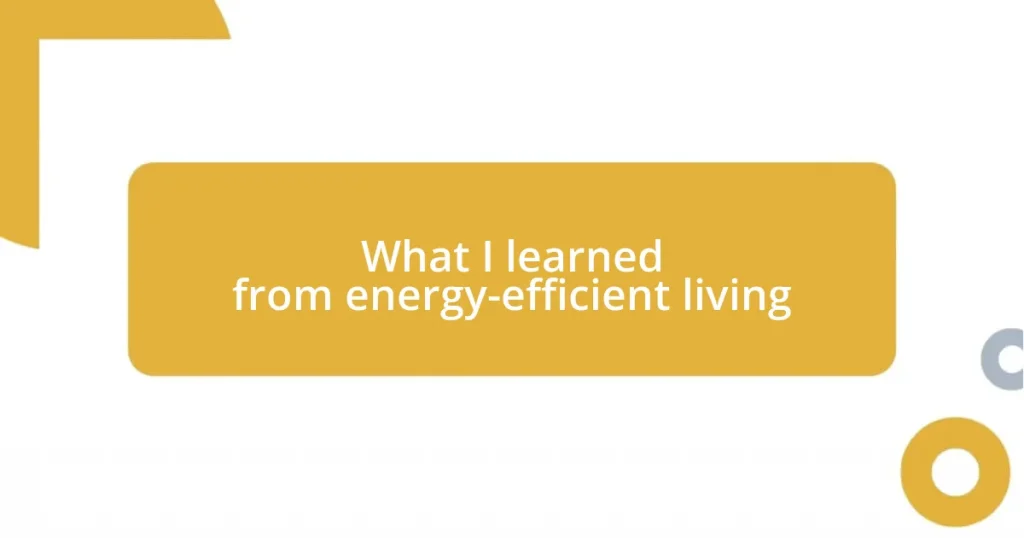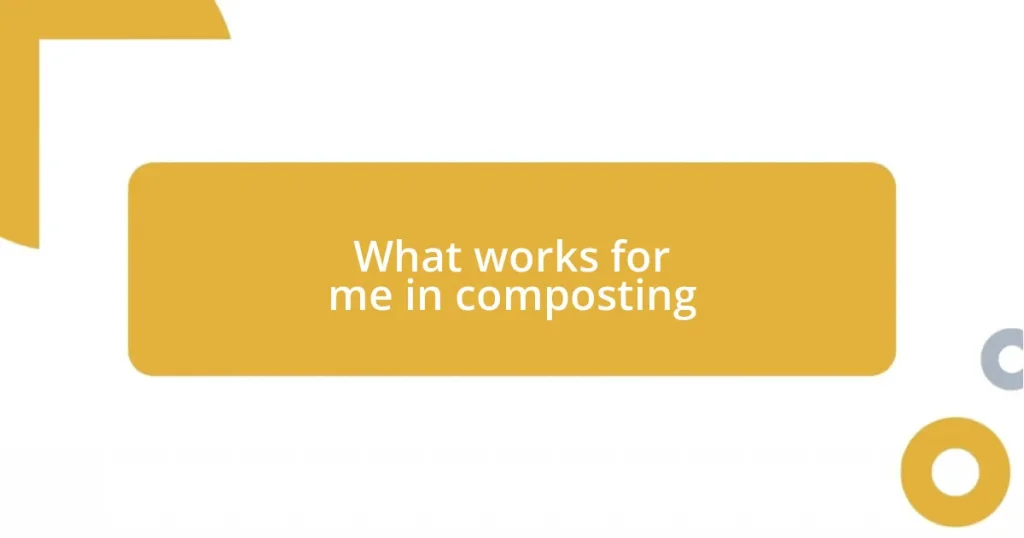Key takeaways:
- Water conservation starts with a mindset shift—understanding the impact of small, mindful changes in daily habits.
- Engaging the family in water-saving practices helps foster a collective commitment to conservation.
- Using tools like rain barrels and smart irrigation systems can significantly enhance water efficiency and plant health.
- Documenting water usage and tracking progress can boost motivation and reinforce conservation efforts.
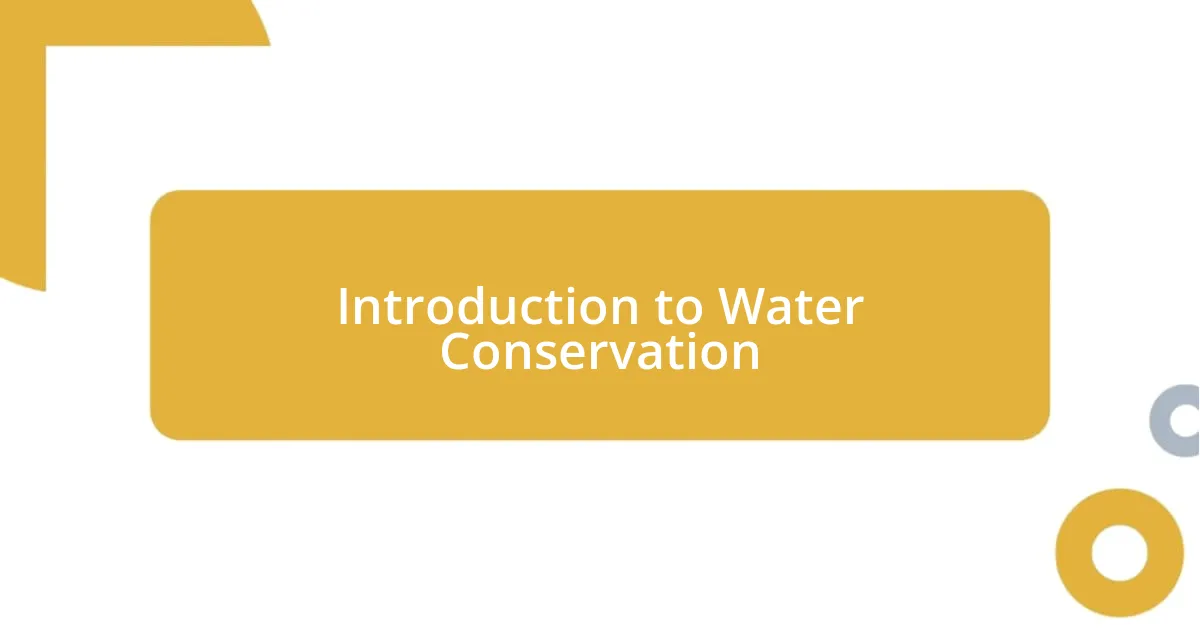
Introduction to Water Conservation
Water conservation feels like a journey I’ve embarked on, sparked by the realization that every drop truly counts. I remember standing in my yard, watching the water drip from the hose as my plants soaked in their nourishment. It struck me: how many of us are wasting water without even realizing it?
I’ve learned that conservation isn’t just about saving water—it’s about cultivating a mindset. There were moments in my life, especially during severe droughts, when I felt a deep connection to this precious resource. The stark, brown lawns and dry riverbeds drove home the point that conserving water is our responsibility, not just a choice. Have you ever experienced the helplessness of watching nature suffer? That feeling has fueled my commitment to change my daily habits.
The beauty of water conservation lies in its simplicity; small changes can lead to significant impacts. I started with simple actions, like fixing leaks around my home or adjusting my shower time. Hasn’t it struck you how such small steps can ripple outwards? Embracing these changes has not only helped the environment but has also been incredibly rewarding for me personally.
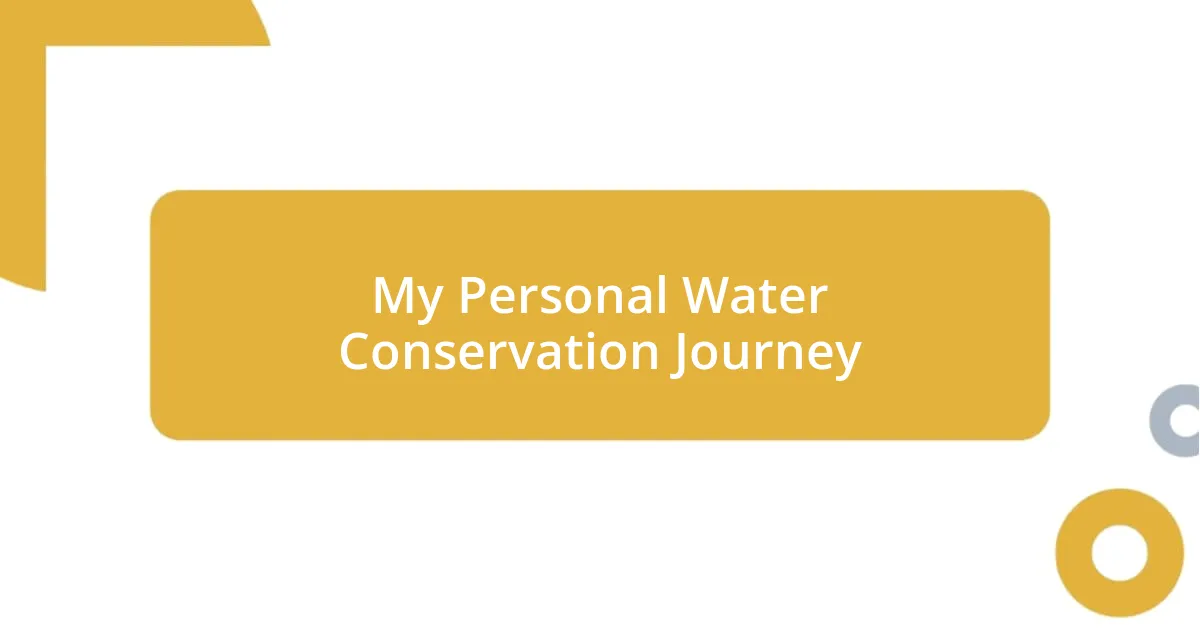
My Personal Water Conservation Journey
Water conservation became a priority for me when I began collecting rainwater. Hearing the sound of droplets hitting a bucket during a downpour filled me with excitement. I realized that nature’s gift could be harnessed to sustain my garden during dry spells. It felt empowering to know I could make a difference, one drop at a time.
Another practice that transformed my relationship with water was changing my landscaping. I replaced some grass with drought-resistant plants, which not only looked beautiful but required less water. The first time I looked out at my yard and saw life thriving without excessive watering, I felt a sense of accomplishment. It’s remarkable how embracing native plants made me feel more connected to my local environment.
Lastly, I began educating my family about water-saving techniques. Involving my kids in simple tasks like turning off the tap while brushing their teeth sparked their interest in conservation. I often share stories of our collective efforts; whether it’s the thrill of pulling weeds or hunting down leaky faucets, these moments have woven a collective commitment to preserving water in our daily lives.
| Action Taken | Impact |
|---|---|
| Collecting Rainwater | Increased awareness and sustainable garden watering |
| Landscaping Changes | Reduced water usage, enhanced local biodiversity |
| Family Involvement | Fostering a community culture of conservation |
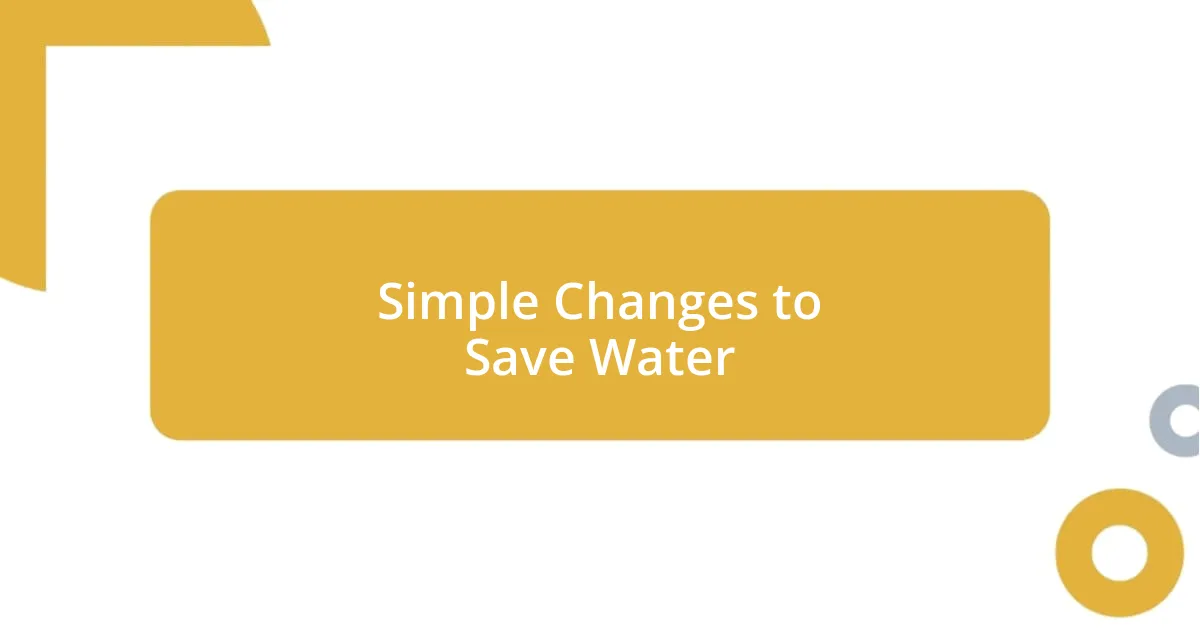
Simple Changes to Save Water
Making simple changes can have a profound impact on water conservation. One of my early realizations was how much water could be saved just by being mindful during everyday tasks. I remember the first time I actually measured how long I let the water run while waiting for it to warm up. I was shocked! Since then, I’ve made it a habit to fill a bucket with that cold water and use it for my plants. It feels like a small win every time I conserve that precious resource.
Here are a few other simple changes that can save water every day:
- Shorter Showers: Reducing your shower time by even a couple of minutes can save gallons of water each week.
- Efficient Dishwashing: I started filling one basin with rinse water instead of letting the tap run. It has made a big difference!
- Check for Leaks: I once found a tiny leak in my bathroom faucet that was wasteful. Fixing it was easy and rewarding—it felt good to take action!
By making these adjustments, I’ve found not just savings on my water bill but a deeper sense of purpose in my daily routine. It illustrates that every small step can lead to larger positive changes for our environment.
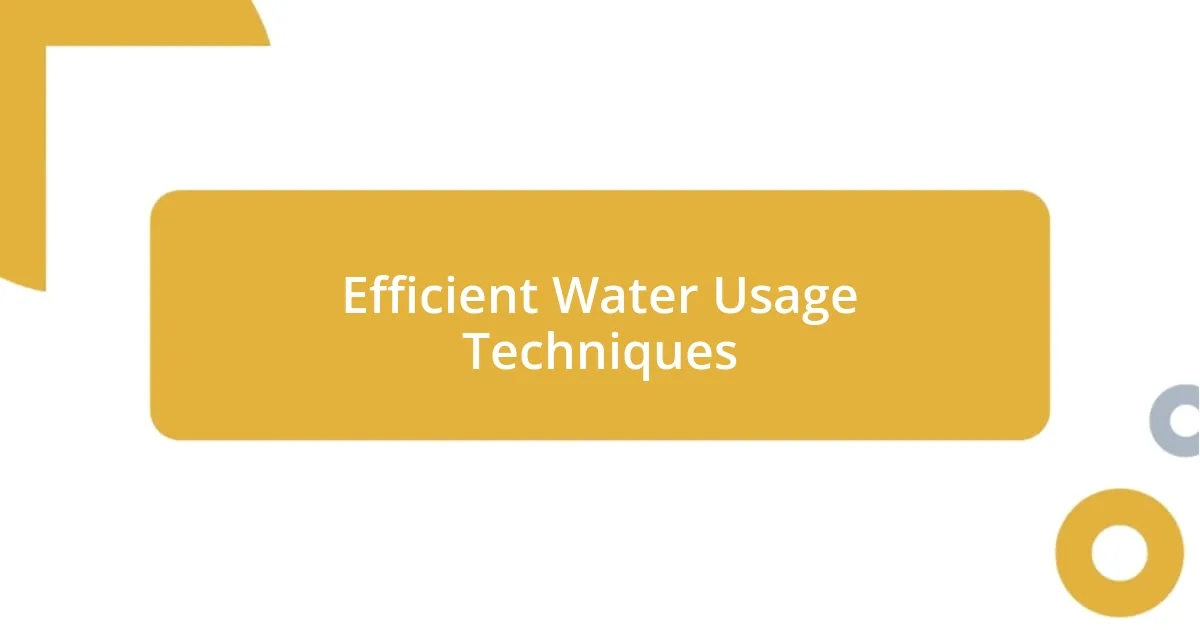
Efficient Water Usage Techniques
One technique that has truly made a difference for me is using a broom instead of a hose to clean driveways and sidewalks. I remember one hot summer day when I decided to try this method, and it felt like a win-win. Not only did I save gallons of water, but I also got a bit of a workout! It’s amazing how often we forget that simple tools can help us be more efficient in our water usage.
Another shift I adopted was capturing shower water while it warms up. At first, it felt cumbersome, but now it’s a natural part of my routine. I’ve turned those warm-up moments into an opportunity to fill buckets for watering the plants. When I look at my thriving garden, I can’t help but smile knowing I made that extra effort. It’s a small change that has great impact—how many wasted minutes and gallons have you saved by just waiting a bit more thoughtfully?
Lastly, I learned about the importance of timing my irrigation. I used to water my garden in the middle of the day, which felt productive but was wasteful. By switching to early mornings or late afternoons, I’ve cut down on evaporation and significantly boosted my plant health. That realization, when my garden flourished like never before, made me appreciate the connection between thoughtful habits and sustainable living. Have you ever considered how the timing of your watering could change your garden? It’s these insights that turn simple actions into powerful conservation strategies.
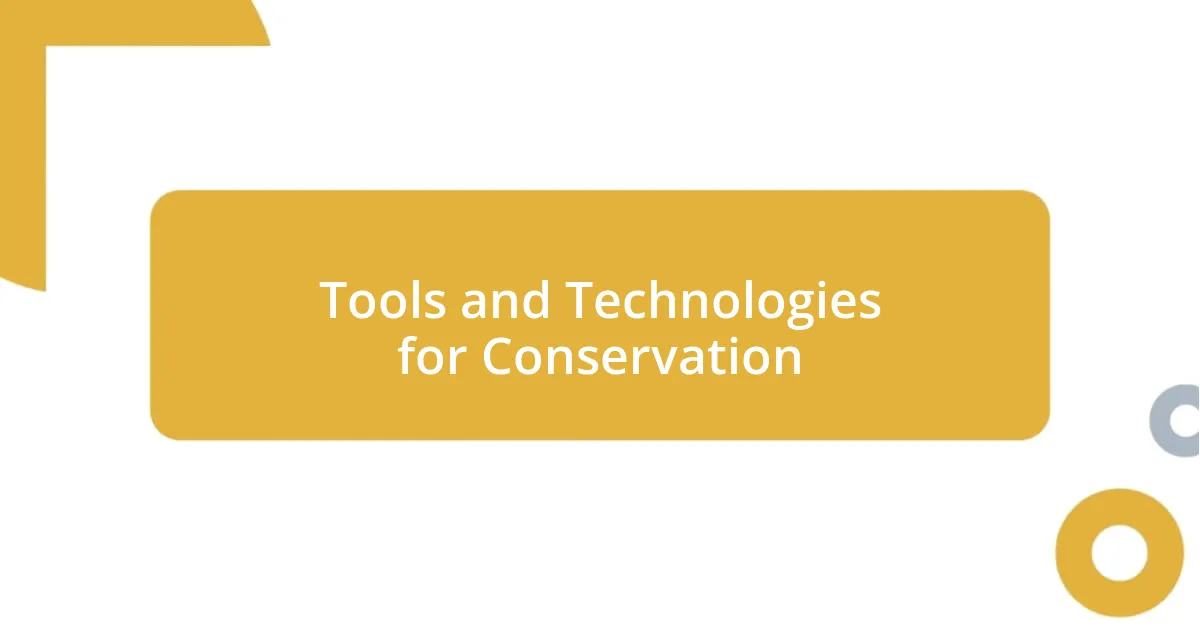
Tools and Technologies for Conservation
Tools like rain barrels have been a game-changer for me. When I first installed one, I was surprised by how much rainwater I could collect just from my small roof. Every time I water my garden, I feel a sense of satisfaction using that free resource instead of depleting the main supply. Have you ever thought of where your water really comes from?
Smart irrigation systems have also made a significant impact in my water conservation efforts. Initially, I was skeptical about using technology to manage my garden’s water needs. But once I set it up, I realized how much time and water I saved without sacrificing the health of my plants. It’s incredible how these systems adjust based on weather forecasts—I’ve actually watched my usage drop while my plants flourished. Don’t you think tools that think for themselves are a smart step toward conservation?
Additionally, I’ve started using moisture sensors. They are simple devices that alert me when the soil is dry enough to warrant watering. At first, I thought they seemed a bit gimmicky, but after a few weeks, I noticed a dramatic decrease in my water use. Why risk overwatering when a little technology can do the thinking for me? My garden has never looked better, and I have the sensors to thank. What tools or technologies have you found to be game-changers in your conservation efforts?
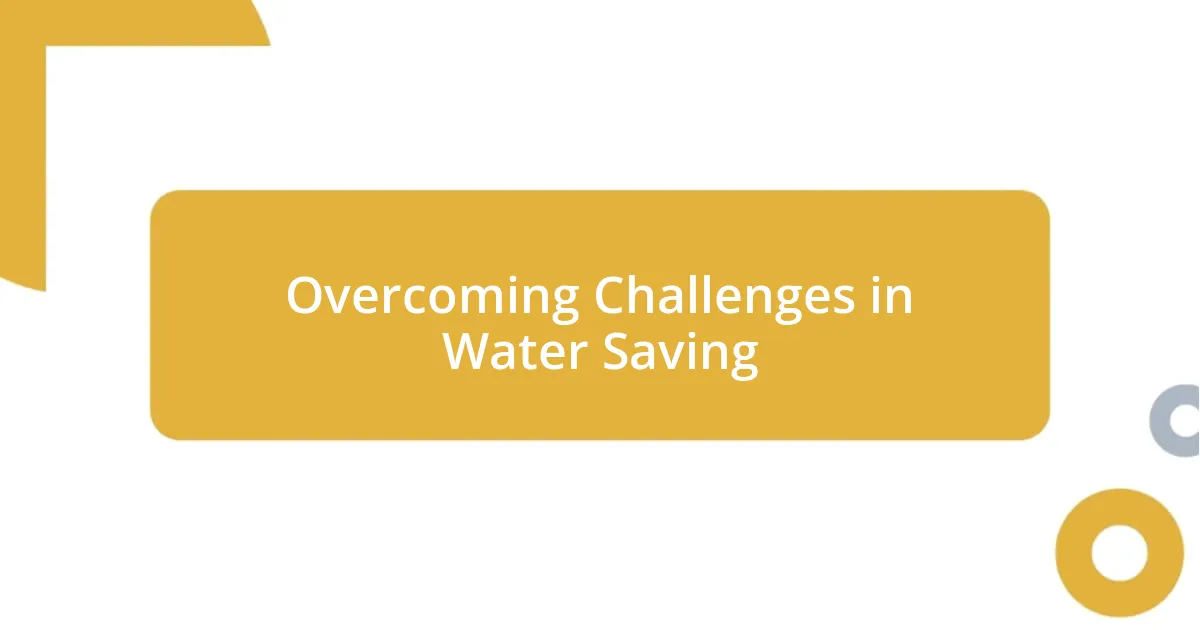
Overcoming Challenges in Water Saving
One of the biggest hurdles I encountered in my water conservation journey was breaking old habits. I vividly recall the frustration I felt when I realized how often I would leave the tap running while brushing my teeth. After committing to a change, I started filling a cup with only the necessary water. This small shift not only saved gallons but also made me more conscious of my consumption. Have you ever thought about how a single moment could lead to a profound change in your habits?
Dealing with unexpected leaks was another challenge I faced. I remember discovering a dripping faucet in my kitchen and feeling overwhelmed by the repairs. Instead of waiting for a professional, I watched a few tutorial videos and tackled the issue myself. The sense of achievement I felt after fixing the leak and realizing how much water I had saved was exhilarating. It’s moments like these that show us the power of taking initiative—how often do you let small problems slide instead of addressing them head-on?
Lastly, staying motivated can sometimes feel like an uphill battle. During the dry summer months, it seemed tempting to turn a blind eye to my conservation efforts. To combat this, I began keeping a water usage diary, tracking both successes and areas for improvement. Looking back at my progress gave me a much-needed boost when the temptation to slack off arose. Have you ever documented your efforts? I found that reflection can reignite commitment and encourage further action.
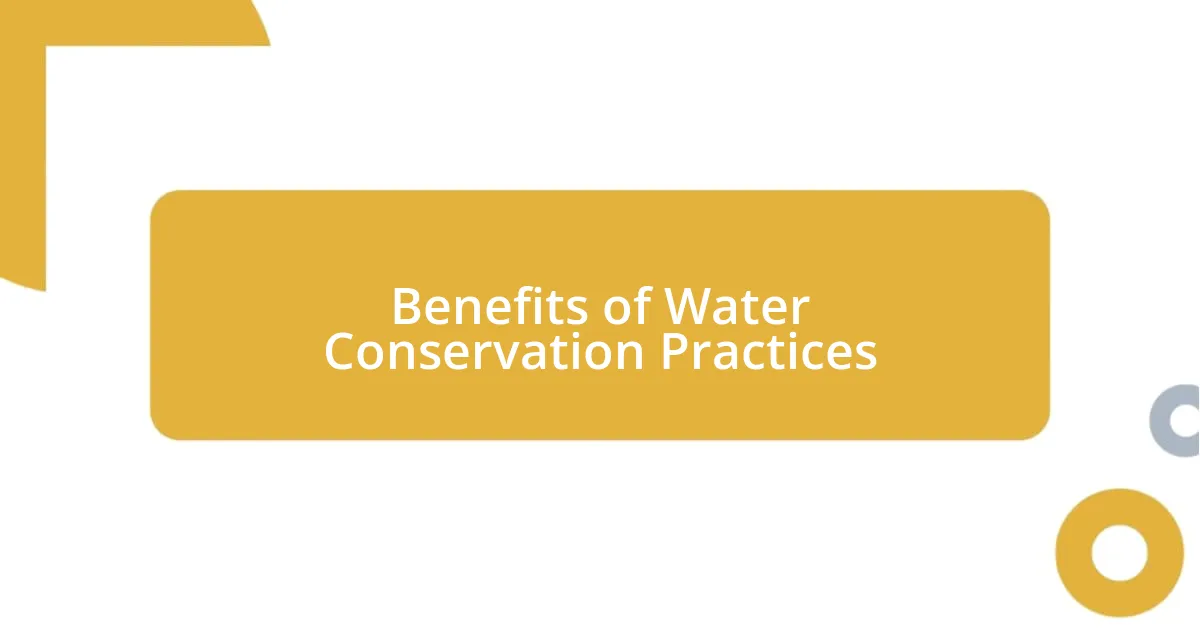
Benefits of Water Conservation Practices
Practicing water conservation has opened my eyes to a wealth of benefits. For instance, not only has my water bill decreased significantly, but I’ve also gained peace of mind knowing I’m actively contributing to a larger cause. Can you imagine the collective impact if each of us made small changes? It feels rewarding to be part of a community that cares for our planet.
One of the standout advantages I’ve experienced is the positive effect on my garden. By using drip irrigation and rain barrels, I’ve noticed my plants thriving like never before. It’s fascinating how they respond to efficient watering—vibrant colors and lush growth all around me. Have you ever felt the joy of seeing something flourish because you made a conscious choice? That connection deepens my commitment to maintaining these practices.
In addition to financial and botanical rewards, I’ve cultivated a newfound awareness of my surroundings. It’s amazing how small changes, like checking for leaks or adjusting watering schedules, promote mindfulness. I’ve found myself appreciating each drop of water more than I did before. Isn’t it enlightening when simple acts lead to profound gratitude? Embracing water conservation has truly transformed my perspective, and I believe it can enrich anyone’s life in similar ways.

